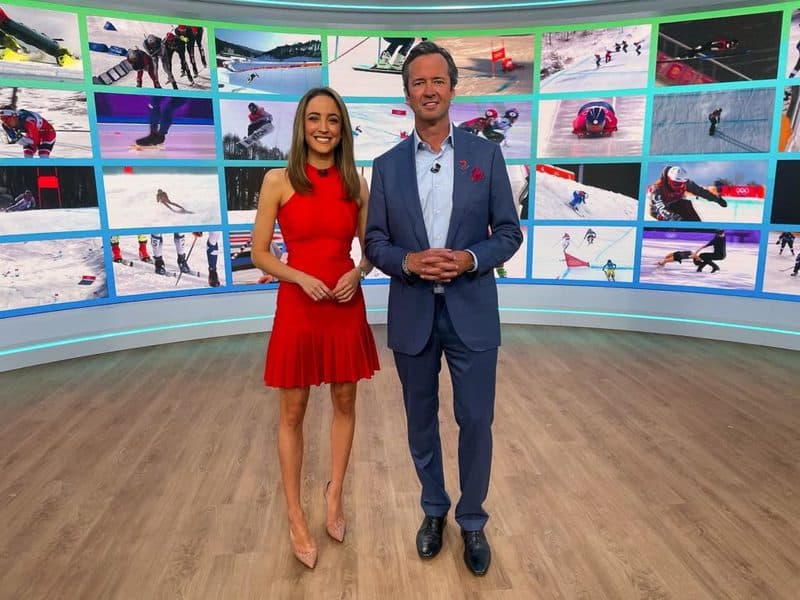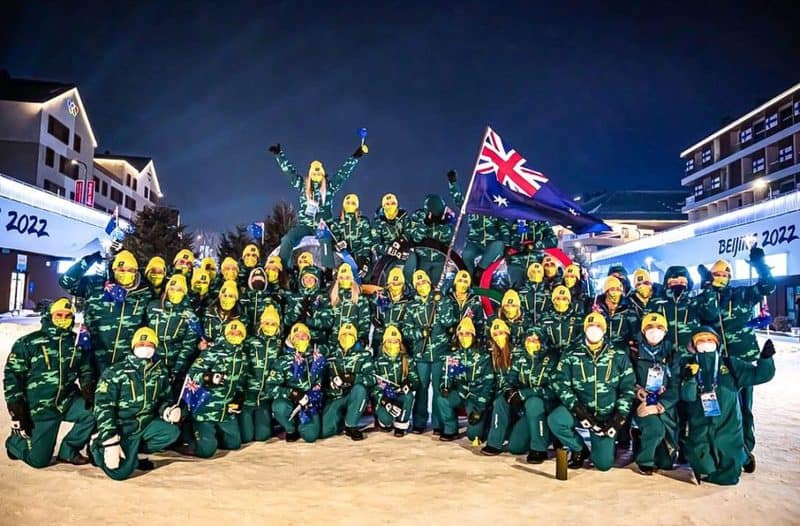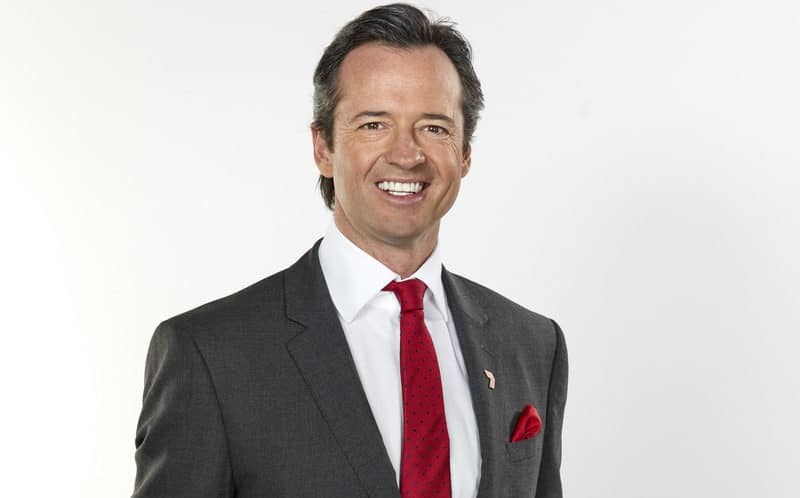Broadcasters and TV hosts like Hamish McLachlan usually get two years or more to prepare and deliver an Olympic Games. Current rights holders though have had to organise two Games – Tokyo 2020 and Beijing 2022 – in a sixth month period.
Leading the way for Seven on its Olympic coverage are the head of sport Lewis Martin and primetime co-host Hamish McLachlan.
In the second of two pieces about the network’s coverage of the Winter Games, Mediaweek’s James Manning speaks with McLachlan.
When Mediaweek asked Hamish McLachlan if Lewis Martin was a good boss, he shot back with “Is this on or off the record?”
“I have found him to be domineering, dominating and volatile,” laughed the 2022 Beijing Winter Games host replied when we assured him the comments would be on the record.
“But he has done an excellent job and I love him,” he added.
McLachlan started at Seven in 2008 hosting the former Sunday AFL show Game Day. “I missed out on the Beijing Summer Games in my first year because all the people had been assigned when I arrived,” McLachlan told Mediaweek. “Then London 2012 was on Nine so my first games were Rio where I hosted nights. I did the same again in PyeongChang [South Korea 2018] and then Tokyo [2020 held in 2021] and this is my fourth with Seven.”
Ahead of working on a major event like an Olympic Games, McLachlan said the preparation includes staying across all the major sports, at least top line. “Six months prior I really start to listen and watch more. In the final four weeks, I try and make sure I am across everything. Too much [preparation] too far out is like trying to get ready for exams at the end of a year in February.
“One thing as a presenter that you feel very aware of is competitors are the son or a daughter of someone, and also a brother, sister, niece or nephew too. The journey they have all been on warrants excellent storytelling. If my son was competing in curling I would want every detail about him told. And told with respect for the athlete.
“One moment where I realised what Lewis had been preaching for a while actually had come to fruition was when my mother rang on day three during Tokyo and asked me how to download 7plus on her iPad. She’s early 70s and happy watching the Olympics on an iPad.
“That is so different to how we all grew up watching Olympic Games. My first was 1984 [Los Angeles]. We had one channel. You would walk up and turn the TV onto the Olympics channel and leave it on for a fortnight.”

Seven’s Abbey Gelmi Hamish McLachlan
Hamish McLachlan and co-host Abbey Gelmi
Asked about his Olympic co-host, McLachlan said: “Abbey is terrific. I am working with someone who I think will be in television for a very long time. She loves sport, she presents brilliantly, she loves telling stories and exudes incredible enthusiasm for what she does. It’s not hard to be excited when you are standing alongside her on the set.
“The studio is the best that any sporting broadcaster has ever been able to use. We call the incredible screen Toby’s TV [operated by Seven’s Toby Harding] because he’s the only tech who knows how to work it. We also have brilliant screen artists Mel and Fran. We can suggest something to them at 4pm and by 7pm the screen looks ridiculous with so much on it.”
When asked about the almost intimidating Seven giant screen, McLachlan said, “It lets us tell the story we wanted to. If we are talking about Matt Graham’s journey we can start images of him as a seven-year-old at Perisher and then walk across the set and get images from him in Beijing. We used to have to sit behind a desk with only an image of Matt. Now we can take the viewers on an illustrated journey which allows everyone to buy into his story.”
Some nights during the Seven 2022 Beijing coverage, McLachlan and Gelmi will hand over hosting duties to Andy Maher and Andrew Gaze on the Friday and Saturday nights. “There might be less crying from Gazey, but that’s not a certainty.” Gaze, a medal-winning former Olympic basketballer, shed tears onscreen as he watched Australia win a medal in Tokyo last year. “Watching Gazey cry – that was one of my most favourite moments since I have been at Seven,” said McLachlan.

Team Australia: Beijing 2022
Beijing Winter Games 2022 medal expectations
Hamish McLachlan: “I am going to go out on a limb and say we are going to have the most medals of any Winter Games ever. We have a total of 15 from all Winter Games – five each of Gold, Silver and Bronze. Our first was in Lillehammer [1994] with the relay and Steven Bradbury. We didn’t then win another medal until 2002. We have never won more than three at a Winter Games.
“I think we can win four medals, maybe more.”
McLachlan wanted to emphasise the achievements of our athletes in actually qualifying for Beijing. With regard to the curling competitors, McLachlan said: “There is no curling rink in Australia. There is also no luge slide. We are competing against people who have grown up on the ice and snow. We punch above our weight in a huge way.
“With Bree Walker we are a chance to win a medal in the bobsled which is something I didn’t think I would ever say in my lifetime.
“Jackie Narracott just won a World Cup event in St Moritz in skeleton. Imagine going 130kph down a slide.
“Also watch the snowboard cross where Belle Brockhoff and Jarryd Hughes are coming in as world champions.”
McLachlan’s final hope could also be a win for Mediaweek: “No Australian has ever medalled in the moguls and if Jakara Anthony does I’ll take you to a nice restaurant of your choosing in Victoria.”
